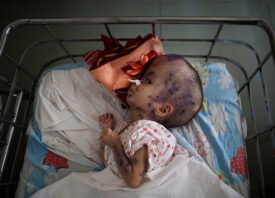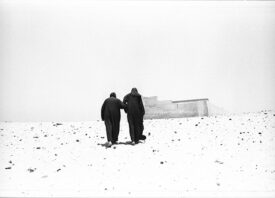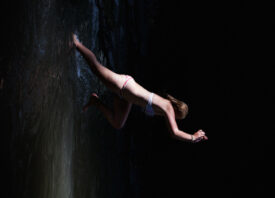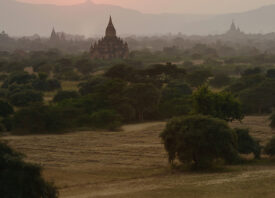Search this site
In the Mountains of Southwestern Macedonia, Monks and Recovering Addicts Live in Harmony



Outside, it was so cold he couldn’t feel his hands. Inside, he didn’t have heat or hot water. Every night Adrian Francis stayed at the monastery in Southwestern North Macedonia, he slept under three blankets, layering himself in every sweater and hoodie he’d carried with him for the journey.
The photographer, who’d been invited to the Bigorski Monastery, slept inside the guest’s quarters, but he spent most of his days at the workshop, as it was the warmest place to be. There, he was in the company of the monks, who were busy at work, woodworking and painting–making relics and adornments for the church. He joined them for sweets, tea, and hot cocoa, and they filled in the quiet moments talking about their homes and families.
Francis first happened upon the Bigorski Monastery while conducting research online. At the time, he was a photography student in Denmark, and, having been raised in a Catholic household, he had a lifelong interest in religion. His interest turned to Macedonia, specifically, when he remembered his upbringing in Syracuse, New York, home to a local Macedonian community and Orthodox church.
The Bigorski Monastery is unique, in part, because of its rehabilitation program. The monastery is home not only to the monks but also to a group of men, ages eighteen to fifty, in recovery from addiction. Francis reached out about the possibility of visiting and photographing their work via email. Two weeks later, he heard back from Father Anatolij, who informed him that the Abbot, Father Partenij,* had agreed. He booked a flight to Skopje, North Macedonia, immediately.
The monastery includes the guest building where Francis stayed; the monks’ quarters; the dormitories for those in rehabilitation; the church; a courtyard; the workshop; a library, kitchen, and tea room; and several common rooms and dining rooms. Finally, there are the dogs. The monks breed the native Karaman shepherd dogs, who live on the side of the mountain. It’s from them that Francis borrows the title of his series: Karaman Mountain.
Each day started promptly at 5:30 AM with prayer, attended by the monks, and often, those in recovery as well. Watching the monks enter the church–one by one, as they kissed each icon along the way, their habits flowing in their wake–reminded Francis of watching the ballet.

From there, he headed into the tea room before sitting down to the first meal of the day: bread and soup. All meals served at the monastery are vegan. The photographer learned quickly to show up to meals on time; if he was off making pictures and missed a meal, it would be another eight to twelve hours until the next one. Over the course of his visit, he lost fifteen pounds.
While he was allowed to photograph much of the monastery, access to the rehabilitation program was restricted to protect the residents and their privacy. Still, Francis witnessed the close friendships that formed between the monks and those in recovery, finding them united by a common goal and a shared sense of discipline.
Meanwhile, withdrawals were managed with the help of a doctor, who administered medications as needed; once they were over, the men would stay busy by carrying out tasks around the monastery, based on their needs and abilities. “Some of them would clean,” Francis says. “Some would cook; some would take care of the orchard, which was the sole source of food for the monastery.” At night, they slept in bunks in the dorms. “They took care of each other,” the photographer remembers. “If one was new, the others would look after them.”
This idea of community runs throughout life at the monastery, where everyone contributes and shares with each other. During his visit, Francis says he was treated like family. “It’s about simply living day by day, knowing you have a meal, a place to sleep, and people who truly care about you,” he admits. “That, to me, is brotherhood.”
While he didn’t speak much with the men in the rehabilitation program, the photographer did spend time with one of them. He didn’t speak English, so they chatted using gestures and signs. They bonded that way.
The monks hailed from small towns across North Macedonia. So did the men in the rehabilitation program. Many of the younger monks had grown up with someone in the program. The photographer grew closest to Father Anatolij, who largely served as his host and guide. They still speak every few months.
Father Efrem, Francis learned, comes from a Muslim family and converted to Christianity. His family is supportive. “I watched him herd sheep, feed them, carry rocks for the new church, start a fire, and then make us tea while we sat outside and chatted,” the photographer remembers. They laughed at memes on Father Efrem’s flip phone.

Then, of course, there were the dogs, who lived according to their own rules. Some could be approached, while others could not. On his first night, one bit the photographer when he approached. It was so cold that he didn’t feel it as it happened, and he was able to wash his wounds with the bitterly cold water back in his room. He worried he might get rabies. Still, Francis was enchanted by the animals. “The dog’s temperaments represented everything this place did–harsh and cold on the outside but kind and warm when they eventually let you in,” he says now.
While the photographer longed to make more pictures featuring the monks prominently, he found that they often preferred privacy. “They don’t like attention because their purpose is to fully serve God and be a representative of God,” he explains. “That’s it, nothing else.” He always asked permission before raising the camera: “I was told no at times, and was completely fine with that.”
When Francis arrived at the monastery, he hoped to find moments of divinity that can define religious spaces. And he did: rays of light, parting clouds, and hands used for prayer are recurring motifs throughout the work. But he was also surprised by the humanity of this place, where everyone’s battling something, whether it’s addiction, in the case of those in recovery, or the pull of feelings such as lust or envy, in the case of the monks. In some ways, these mortal moments–the ones that highlighted the experiences we all share–felt the most sacred.

“‘Lord Jesus Christ have mercy on me’ is what we repeat every second of every day. The perfect monk is the one who masters prayer first through the mind and then through the heart. There are three steps: Purity of the heart and desires, enlightenment, and then divinity. When you are enlightened, you have reached the kingdom within. The afterlife doesn’t matter for us; I want to live with Christ here and now, through the kingdom within. Once I can do that, I am divine.”
On his second to last day at the monastery, Father Anatolij permitted Francis to enter the tomb that now houses the skulls of the monks who once lived there. “He went in first, without me, to pray,” the photographer remembers. “Then, I was able to go in. I was shocked he allowed me to photograph it. I still look at it like he was giving me this special gift. I thought about what type of men they had all been. I couldn’t help but think too that his skull would be there someday, along with the other incredible monks of the monastery I had the pleasure of meeting.”







“The best thing a monk can do is pray for people, not give advice. To be a monk, you have to be radical. We don’t see Christianity as a religion, but rather as a way of life. We see man as a creature ill with sin. There is only one cure for that illness, and that is the merits of Christ, who was crucified for us, ascended into heaven, and resurrected on the third day.”
*Father Partenij is now a Bishop.
All images © Adrian Francis



